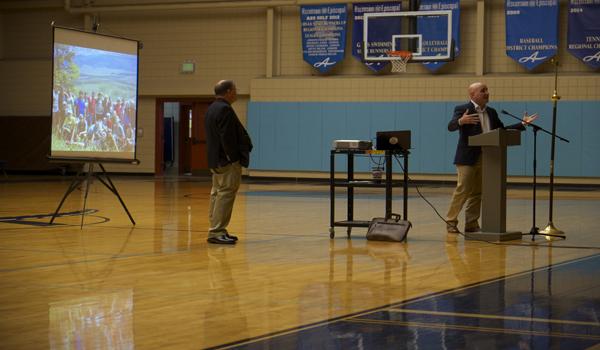On Friday, December 5th, 2014 AES Upper School had two guest speakers during chapel who did more than give the average everyday chapel talk.
Mr. Lawrence “Moose” Billeaud and Dr. Nathan Roberts, both parents of past and current AES students, gave students valuable information about the precautions one should take when using social media and the many repercussions that can occur when teenagers chose to indulge in drugs and alcohol.
Both Mr. Billeaud and Dr. Roberts are lawyers. Mr. Billeaud currently practices law while Mr. Roberts is the Director of Graduate Studies in Education at the University of Louisiana at Lafayette. Both men have worked very closely with drug, alcohol, and social media cases in relation to teenagers in the Lafayette Parish area.
The discussion AES high schoolers heard during chapel on December 5th is a public service offered by The University of Louisiana at Lafayette and is not part of a specific group or organization. Dr. Roberts has been giving talks about drug and alcohol abuse in young teens for about five years and has been speaking with Mr. Billeaud about current social media issues, drugs, and alcohol misuse for about a year and a half now.
Mr. Billeaud and Dr.Roberts touched on the repercussions of four key points; The misuse of drugs and alcohol, sexting, and cyberbullying. Mr. Billeaud discussed the new synthetic marijuana that causes intense hallucinations and is the now the number one date-rape drug. He also advised underaged students from serving as the “designated driver” for friends who drink. Such well-meaning students can still be charred with aiding and abetting a minor.
Dr. Roberts discussed how much of an impact social media truly has on our lives. He stated that bullying is becoming more prominent in younger children due to social media websites such as Facebook, Instagram, and Twitter. He also stated that it is important to remember to never post something when you’re angry, but wait 48 hours before posting.
Mr. Billeaud said that the most disheartening part of giving these talks to high school students is the possibility that they won’t listen.
“The hardest for me is remembering my two clients who died, and I wasn’t able to help them, and one of them I candidly spoke with the night before he died and it is still difficult for me. If I make a difference in saving one kid’s life, that still a difference. I know some kids don’t like to listen to parents or teachers, so if they listen to me, I am thankful.”
Dr. Roberts responded in a very similar way.
” The hardest is seeing the kids I work with live with the consequences of their actions. I’ve seen to many people commit suicide because of how they were treated. Some people may be able to laugh it off, and others are much more vulnerable, and those are the kids that people tend to pick on. Seeing that is why I do this.”

